- Home
- Kate DiCamillo
Where Are You Going, Baby Lincoln? Page 2
Where Are You Going, Baby Lincoln? Read online
Page 2
“Hi,” said the woman. She smiled. “You were talking in your sleep. Something about mousetraps. I’m Sheila Marsden.”
“I am Baby Lincoln,” said Baby. “How do you do?”
“Baby?” said Sheila.
“Baby,” said Baby.
“Your parents named you Baby?”
“No,” said Baby. “That is what my sister, Eugenia, named me. Very early on, Eugenia said, ‘I don’t care what her name is. I am going to call her Baby. She is the baby, my baby.’ And so I became Baby. And remained Baby.”
“Wow,” said Sheila. “That’s kind of intense. What’s your real name?”
“Lucille Abigail Eleanor Lincoln,” said Baby. It felt strange to say her real name. Sometimes Baby even forgot she had one.
“Lucille Abigail Eleanor Lincoln,” repeated Sheila. “Cool. I like that name. Do you want a jelly bean, Lucille?”
Sheila held out the bag of jelly beans. Baby selected a yellow one. “Eugenia often says that jelly beans are bad for the teeth,” said Baby. She put the jelly bean in her mouth. It tasted like sunshine. “Eugenia is not a fan of the jelly bean.”
“That doesn’t surprise me,” said Sheila. “Have another one.” She held out the bag again.
Baby selected a green jelly bean. It tasted like green leaves, things growing, springtime. She closed her eyes and chewed. The jelly bean was wonderful.
“So, where are you headed, Lucille?”
Lucille? Who was Lucille? And then Baby remembered. She was Lucille.
“I don’t know where I’m headed,” said Baby. “Well, I do know. I’m going to Fluxom. But it is more complicated than that. You see, I am on a necessary journey.”
“That’s cool,” said Sheila. “Necessary journeys are cool. I’m on my way back to college, which is necessary, I guess.” She shook the jelly bean bag. “Have another one,” she said.
Baby selected a white jelly bean. She wondered if it would taste like snow.
“You can take more than one at a time, you know,” said Sheila. “You can take a whole handful if you want to.”
Baby leaned in closer to Sheila. She considered the bag. She took a purple jelly bean and a white one with yellow spots and several more green ones. She put them all in her mouth at once and chewed. Baby hadn’t realized how hungry she was. She was glad that Sheila Marsden and her jelly bean bag had shown up.
Baby leaned back in her seat. The train seemed to be going faster, and from somewhere far away Baby heard music. It was a song that she knew but couldn’t quite place.
“Do you hear music?” she said to Sheila.
“I hear something,” said Sheila. She closed her eyes. She was quiet. “I’ve got a physics professor who says that the stars sing to each other all the time. Isn’t that cool? Maybe the music we’re hearing is the stars singing.”
Did the stars really sing? Why had no one told Baby that before?
“Have another jelly bean, Lucille,” said Sheila.
Baby leaned forward to inspect the jelly beans. Sunlight streamed in through the train window. Dust motes danced in the beams of light. Baby could still hear the music playing somewhere very far away. She felt another wave of happiness wash over her.
“Take a handful,” said Sheila.
Baby took a handful.
Sheila got off the train at Hickam Briar. She stood on the platform and waved to Baby. She called out, “Good-bye, Lucille! Good-bye!”
Sheila left Baby with an assortment of jelly beans tied up in a handkerchief. The handkerchief had Sheila’s initials embroidered on it.
“See?” said Sheila when she gave Baby the handkerchief. “S.A.M. Those are my initials. Sheila Ann Marsden. My father embroidered that. He is very good with a needle and thread. If he knew you, he would sew your initials onto a handkerchief, too. Lucille Abigail Eleanor Lincoln. L.A.E.L.”
Baby thought that she would miss Sheila quite a bit, but she didn’t have time to miss her, because soon after the Hickam Briar station, the conductor appeared in the aisle by Baby’s seat. With the conductor was a very small boy with a paper crown on his head and a sign around his neck. The sign said TRAVELING ALONE. PLEASE TREAT WITH EXTREME CARE, GENTLENESS, AND ALSO SOME CAUTION. HEADED TO FLATIRON IN CARE OF HIS AUNT GERTRUDE.
“My goodness,” said Baby.
“I was wondering if you could keep an eye on this boy,” said the conductor. “I was wondering if you could, uh, protect him.”
The boy looked deeply unhappy. His eyes were red. His crown was crooked.
“Me?” said Baby.
No one had ever asked her to protect anyone.
“Yes,” said the conductor. “You.”
“Of course,” said Baby. “I would be delighted.”
“Good,” said the conductor. “As the sign says, the boy is traveling alone.”
The conductor cleared his throat. “And he is worried that, uh, wolves might attack the train.”
“Wolves?” said Baby.
“That is his concern,” said the conductor. “He has expressed it to me several times in a very, uh, vehement fashion. Wolves. Attacking the train.”
The boy crossed his arms over his sign. He looked down at the floor. He was really very small to be traveling alone.
“You sit here,” said the conductor to the boy, “in the aisle seat, see? And if the wolves come in through the window like you say they will, then they will, uh, get to this lady first, and that will slow them down some, right? Okay?”
“My goodness,” said Baby. An image of the wolf from “Little Red Riding Hood” popped into her head. His teeth gleamed in a menacing way. Baby shook her head to dispel the wolf. She patted the seat beside her and smiled at the boy. “Sit down,” she said.
The boy sat down and the conductor heaved a dramatic sigh. “Right,” he said. “Good luck to both of you.”
The conductor walked away, and the boy sat staring straight ahead with his arms still crossed over his sign.
“Well,” said Baby. “Here we are.”
“I’m not supposed to talk to strangers,” said the boy.
“Of course,” said Baby. “I understand.” She got out Sheila’s handkerchief and untied the knot. “Would you care for a jelly bean?” she said.
“I’m not supposed to take candy from strangers,” said the boy.
“But I’ve been assigned to protect you,” said Baby.
The boy looked up at Baby. His eyes were a bright blue. He looked down at the jelly beans.
It became very quiet on the train.
The boy sighed. He said, “Wolves have very sharp teeth.”
Baby nodded.
“And when wolves get hungry, they do terrible things,” said the boy. “Like attack trains.”
Baby nodded again. “I believe you,” she said. “Have a jelly bean.”
The boy leaned forward. He unfolded his arms. He selected a yellow jelly bean.
“My name is George,” he said.
Baby felt a small shiver of happiness.
“George is a wonderful name,” said Baby. “I am glad to meet you, George. My name is Lucille.”
And saying her name, her real name, caused Baby to feel another ripple of joy.
George said, “I thought that this yellow jelly bean would taste like lemon, but it tastes like pear.”
“Do you like it?” said Baby.
George nodded. “I like pears. My aunt Gertrude has lots and lots of pear trees in her backyard. She probably has a hundred pear trees. I am going to stay with my aunt Gertrude. But I only agreed to go because of the pears.”
Baby nodded.
“Something terrible has happened,” said George.
“Oh, dear,” said Baby.
“Something horrible,” said George.
“Does it have to do with wolves?” said Baby.
And then, to Baby’s horror and dismay, George started to cry.
It was a crisis. And Eugenia was the sister who was good in a crisis, not Baby.
&
nbsp; “Oh, no,” said Baby. “Oh, dear.” She emptied the jelly beans onto her lap and handed Sheila Marsden’s monogrammed handkerchief to George. Her hands were shaking.
“I am so afraid,” said George. He clutched the handkerchief. He cried louder.
Baby understood being afraid. When she was young, she had been afraid of everything: bats, bicycles, dusk, the darkness that followed dusk. Doorbells. She had, for some reason, been absolutely terrified of doorbells. Being alone had frightened her. And so had Mondays.
Eugenia was afraid of nothing, of course.
But whenever Baby had been afraid, Eugenia would sit with her in the green chair in the living room and read aloud to her. There was a lamp next to the green chair and the lamp made a yellow pool of light, and inside that pool of light, sitting next to Eugenia, Baby had been safe.
Baby felt a sudden, sharp pain high up in her chest.
She missed Eugenia.
George hiccupped. He used Sheila’s handkerchief to blow his nose. “This handkerchief smells like jelly beans,” he said. He took a deep breath and started to cry again.
“When I was a girl, I was frightened all the time,” said Baby. “And when I was particularly frightened, my older sister would read to me, and that always made me feel safe. Would you like to hear a story?”
George nodded. “Yes,” he said.
But then Baby remembered that the only book she had was The Inimitable Spigot. Her heart fell. She did not think that The Inimitable Spigot was the kind of book that would cheer anybody up. But she supposed it would have to do.
Baby opened the book. “Page One, Chapter One,” said Baby.
George snuffled.
“‘Detective Henrik Spigot was an extraordinary man, and was recognized by the department of police, the town of Winsome, and the whole of humanity as such. No mystery was truly a mystery to Detective Spigot — or at least it did not remain a mystery for long.
“‘Detective Spigot lived alone in a green house on a high hill, and from there he could see the whole of Winsome spread out below him. The detective watched the people of the town from up high on his hill. He waited.’”
Baby paused.
George blew his nose into the handkerchief.
Detective Spigot is smug, Baby thought. I do not care for him.
George took a great gulp of air and held it in and then let it go in a whoosh.
“Aren’t you going to read?” he said.
“Yes,” said Baby. “But I was reading the wrong story.”
“It wasn’t much good,” said George.
“I know,” said Baby. “I will read the right story now.”
“Good,” said George.
Baby cleared her throat. She flipped to the middle of the book. She held The Inimitable Spigot up in front of her. “Chapter One,” she said. “Once upon a time, there was a king. The king was wise and good. But he was lonely. And sometimes, late at night, he would stand in his garden and watch as stars fell through the night sky, chasing each other. The king was certain that he could hear music, the sound of the stars calling out to each other in the darkness. The music comforted the king.”
Baby paused. The words she was reading weren’t on the page at all. She, Lucille Abigail Eleanor Lincoln, was making them up.
“Keep going,” said George.
And Baby did.
“The king had not always been a king. Once, he had been a boy who lived with his aunt in a small house on the side of a long, dark road. And behind this house, there grew pear trees, hundreds of them.
“The pear trees had been planted by a wizard named Calaband Darsh. And at the same time that the wizard planted the pear trees, he also cast a spell so that the boy, when he looked upon a pear, was able to see the entire universe hidden there. And this, it turned out, was a very good thing for a king to be able to do.”
Baby felt George leaning in toward her.
She turned the page. “But I am getting ahead of myself. This is a long story,” she read. Or pretended to read. “And it must be told right. All stories involving kings and wizards and wolves are important and must be told in a certain way and in their own time.”
“There are wolves in this story?” said George.
“Of course,” said Baby.
“Good,” said George. “Keep going.”
Baby read on.
The words of the story came to her without her thinking too much about what they should be. It was as if she were reading a book that already existed, telling a story that she already knew.
As she read, George leaned in closer and closer until, finally, he was leaning right up against her. He was warm. He smelled like peanut butter and construction paper.
“The wolves obeyed no man, of course,” said Baby. “But they would sit and listen to the king. He could make it so that his human words made sense to their wolf ears and wolf hearts.”
Baby looked down at George.
“Should I keep reading?” she said.
“Keep reading,” said George.
It was late afternoon and the train was making a clickety-clackety sound as it headed through the universe.
Baby kept reading.
George’s aunt Gertrude was waiting for him on the platform in Flatiron.
“That’s her,” said George. “There she is.” He pointed.
Aunt Gertrude looked worried and flustered. She looked kind.
Baby’s heart gave a small ping. Who would be waiting for her on the platform in Fluxom?
Eugenia would not be standing there. Eugenia was surely very, very angry at Baby for running away.
Eugenia was terrifying when she was angry. Baby’s heart gave another, different kind of ping.
“Good-bye,” said George.
He stood. He adjusted his crown. “Thank you for reading me the story. I could tell that you were making it up.”
“You could?” said Baby.
George nodded. “I’m small,” he said. “But I can read.”
“Oh,” said Baby. She was strangely disappointed.
“I need to know what happened to the king,” said George.
“Well,” said Baby. She felt a flush of happiness, certainty. “I will write to you. I will tell you what happens next.”
“All of it?” said George. “The whole story?”
“Every bit of it,” said Baby.
The conductor came to escort George off the train. Baby lowered the window. She shouted out to Aunt Gertrude. She said, “Hello, I am a friend of George and my name is Lucille Lincoln. I live at Fifty-two Deckawoo Drive in Gizzford. If you write to me, I will write to George.”
Aunt Gertrude smiled. She waved. She said, “Lucille at Fifty-two Deckawoo Drive! We will write to you!”
And then George was on the platform. Aunt Gertrude hugged him. She enveloped him.
The train started to move.
Aunt Gertrude and George waved at Baby, and Baby waved back.
“Good-bye, Lucille,” shouted George.
His golden paper crown glinted in the last of the evening light.
Baby leaned back in her seat and closed her eyes. She thought about the house on Deckawoo Drive and the way the sun shone on the kitchen table in the early morning and again, from a different angle, in the late afternoon.
She thought about Eugenia sitting at the table.
Baby’s heart clenched.
She wanted to go home.
It was dark in Fluxom.
The station platform was empty.
“Fluxom!” shouted the conductor. “Disembark for Fluxom!”
Baby took hold of her suitcase. She stood. The conductor helped her down the metal stairs.
And then the train pulled away and Baby was alone on the platform.
Somewhere, hidden in some scraggly bush by the train tracks, a cricket sang. The song was high and sweet and it made Baby feel even more lonely. She thought about the stars and how they sang to each other. She listened very closely, but she could not hear
their music. She could only hear the lone cricket.
“Baby!” someone shouted.
Baby saw Eugenia and Stella walking toward her. Her heart thumped once, twice, three times. First it thumped in disbelief (Eugenia had come) and then it thumped in gratitude (Eugenia had come for her) and then, finally, it thumped with joy (Eugenia had come for Baby!).
“Baby Lincoln!” called Stella. “We came to meet your train! I knew where you were going and what time you would arrive because I was the one who read the train schedule. And I thought it would be very bad if you got off the train and no one was here to meet you. Wouldn’t that have been very bad? And so Mr. Watson and Eugenia Lincoln and Mercy Watson and me drove all the way here. I navigated! I held the map! And Eugenia Lincoln was upset because she did not get to hold the map. And she was also upset because Mercy got to sit in the front seat. Mr. Watson and Mercy are waiting in the car, and you can hold the map on the way home if you want to, Baby Lincoln.”
“This is all just ridiculous,” said Eugenia. “It is absurd! I can’t believe we drove with a pig in the front seat to the middle of nowhere.”
“Oh, Sister,” said Baby. “I missed you so.”
Eugenia sniffed. She looked away.
“Eugenia missed you back!” said Stella. She jumped up and down. “She missed you and missed you and missed you. It’s true. It’s all she could talk about. ‘Where is Baby? We must find Baby! What will I ever do without Baby? I would be lost without Baby.’ That is what Eugenia said.”
“Is that true, Sister?” said Baby. “Would you be lost without me?”
“Perhaps,” said Eugenia. She stared off at the horizon.
“Tell her,” said Stella. She took hold of Eugenia’s hand and swung it back and forth.
“I missed you,” whispered Eugenia. “I would be lost without you, Baby.”

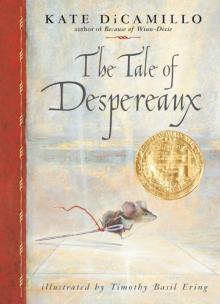 The Tale of Despereaux
The Tale of Despereaux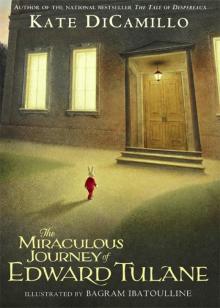 The Miraculous Journey of Edward Tulane
The Miraculous Journey of Edward Tulane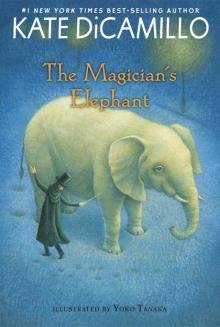 The Magician's Elephant
The Magician's Elephant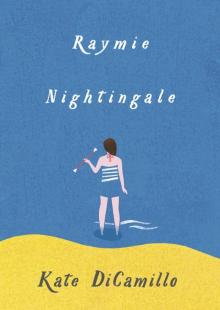 Raymie Nightingale
Raymie Nightingale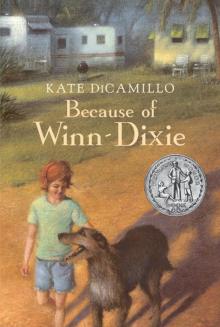 Because of Winn-Dixie
Because of Winn-Dixie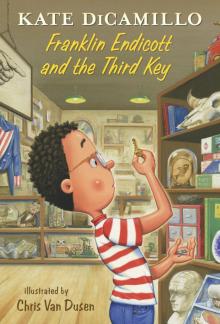 Franklin Endicott and the Third Key
Franklin Endicott and the Third Key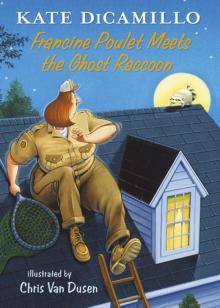 Francine Poulet Meets the Ghost Raccoon
Francine Poulet Meets the Ghost Raccoon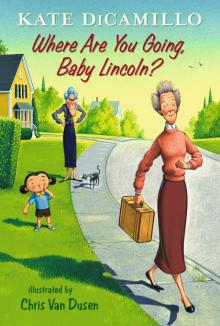 Where Are You Going, Baby Lincoln?
Where Are You Going, Baby Lincoln?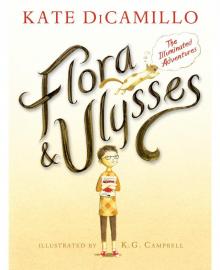 Flora & Ulysses: The Illuminated Adventures
Flora & Ulysses: The Illuminated Adventures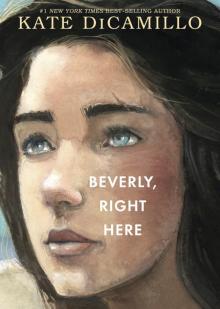 Beverly, Right Here
Beverly, Right Here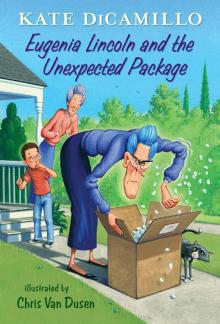 Eugenia Lincoln and the Unexpected Package
Eugenia Lincoln and the Unexpected Package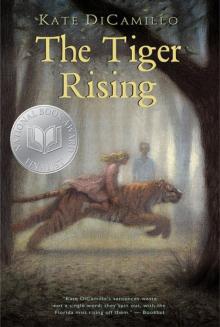 The Tiger Rising
The Tiger Rising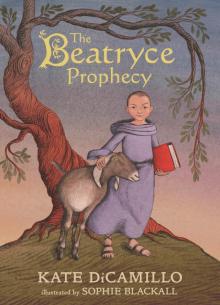 The Beatryce Prophecy
The Beatryce Prophecy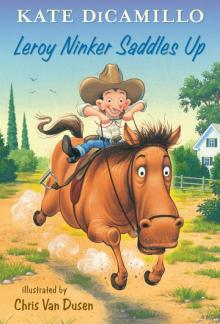 Leroy Ninker Saddles Up
Leroy Ninker Saddles Up